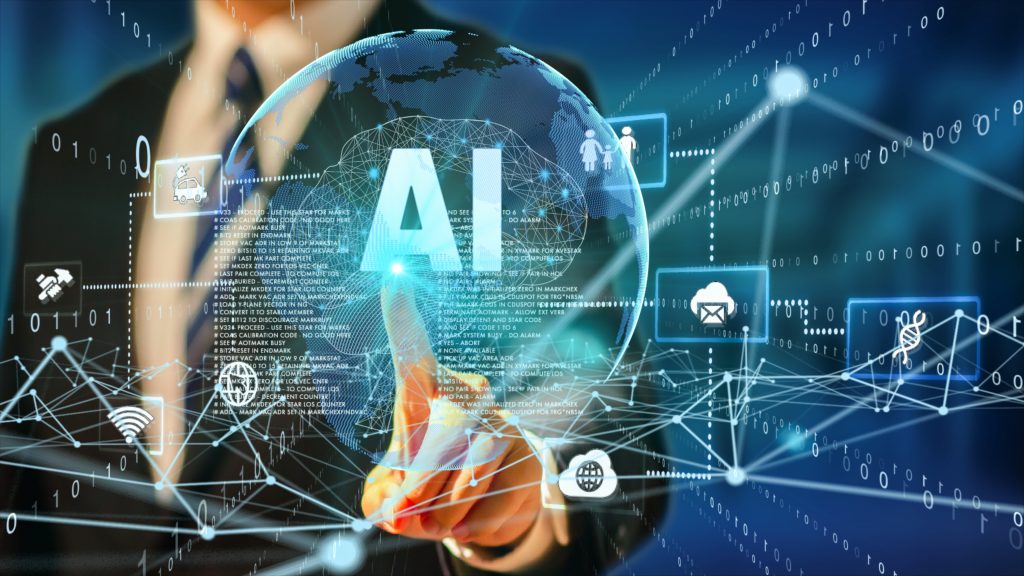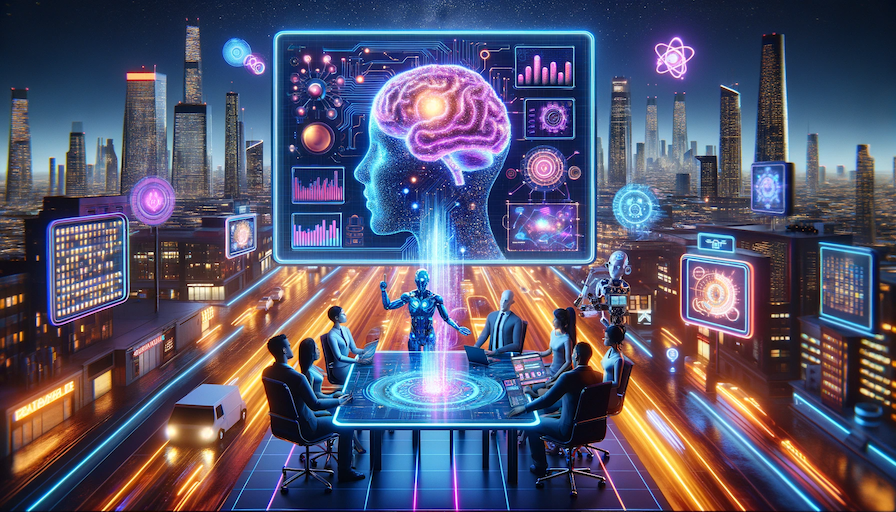Artificial Intelligence (AI) has redefined industries, and marketing is no exception.
From enhancing customer interactions to optimizing campaign performance, AI is at the core of digital transformation.
In this blog, we explore the role of AI in marketing, future trends, and the strategies you need to thrive in the age of digital transformation.

Introduction: Why AI is a Game-Changer in Digital Marketing
AI is revolutionizing digital marketing by enabling smarter decisions and creating personalized customer experiences.
It’s no longer a tool for the future—it’s a vital part of modern marketing strategies.
Whether it’s chatbots that provide 24/7 customer support or predictive analytics that forecast trends, AI is reshaping how brands connect with their audiences.
Its ability to process massive amounts of data in real-time makes it an invaluable asset.
This transformation has empowered businesses of all sizes to compete in a digital-first world.
But the question remains: Are you ready to embrace this revolution?
Key Applications of AI in Marketing Today
Personalization at Scale
AI enables hyper-personalized marketing by analyzing user behavior, preferences, and purchase history.
This allows brands to deliver the right message to the right person at the right time.
For example, e-commerce platforms like Amazon use AI to recommend products tailored to individual users.
Netflix does the same with content recommendations, keeping users engaged longer.
Such personalization drives customer satisfaction and boosts sales.
Marketers can leverage AI-driven platforms to segment audiences and create personalized campaigns effortlessly.
Enhanced Customer Interactions
AI-powered chatbots and virtual assistants are transforming customer service.
They provide instant responses, resolve queries, and even make product recommendations.
Tools like ChatGPT have elevated conversational AI, enabling human-like interactions.
This not only saves time but also enhances customer experience by offering support 24/7.
Businesses can integrate AI chatbots into websites, apps, and social media channels to improve accessibility.
The Role of Predictive Analytics in Shaping the Future
Data-Driven Decision Making
AI excels in analyzing historical data to predict future outcomes.
This is invaluable for marketers looking to anticipate customer needs and adjust strategies.
Predictive analytics identifies trends, highlights potential risks, and uncovers new opportunities.
For instance, AI tools can forecast which products are likely to sell during specific seasons, enabling better inventory planning.
By leveraging this capability, businesses can make informed decisions and reduce guesswork.
Optimizing Campaign Performance
AI tools like Google Ads’ Smart Bidding use predictive analytics to adjust bids in real-time.
This ensures ad budgets are spent efficiently, maximizing ROI.
AI can also monitor campaign performance continuously, making adjustments to improve outcomes.
Marketers can focus on strategy while AI handles execution and optimization.
AI-Powered Content Creation and Distribution
Generating High-Quality Content
Content creation is often time-consuming, but AI has streamlined the process.
Tools like Jasper AI and Writesonic can generate blogs, social media posts, and ad copy in minutes.
These platforms analyze audience data to ensure content resonates with the target audience.
This saves time and ensures content is tailored to specific goals.
While AI can’t replace human creativity, it complements it by handling repetitive tasks.
Smart Content Distribution
AI optimizes content distribution by identifying the best platforms and times to reach your audience.
Social media algorithms powered by AI prioritize content that users are likely to engage with.
For example, AI tools like Buffer and Sprout Social analyze engagement metrics to recommend posting schedules.
This ensures content reaches the right audience at the right time, maximizing impact.
Future Trends in AI and Digital Marketing
Voice Search Optimization
With the rise of voice assistants like Alexa and Siri, voice search is becoming increasingly popular.
AI-driven tools help optimize websites for conversational queries, enhancing search visibility.
Brands must adapt by focusing on long-tail keywords and natural language processing.
Augmented and Virtual Reality (AR/VR)
AI-powered AR and VR experiences are set to redefine how consumers interact with brands.
Virtual try-ons, immersive ads, and virtual shopping environments are already gaining traction.
For instance, IKEA’s Place app allows users to visualize furniture in their homes through AR.
Such experiences make online shopping more engaging and personalized.
The Ethical Implications of AI in Marketing
Data Privacy and Transparency
AI’s reliance on data raises concerns about privacy and security.
Marketers must ensure ethical practices by being transparent about data collection and usage.
Adhering to regulations like GDPR and CCPA is critical to maintaining trust.
Businesses should also invest in secure data storage solutions to protect sensitive information.
Balancing Automation and Human Touch
While AI enhances efficiency, over-reliance on automation can make interactions feel impersonal.
It’s essential to strike a balance between AI-driven tools and human involvement.
Personal connections and empathy remain vital in building lasting customer relationships.
How to Prepare for the AI Revolution in Marketing
Upskilling Your Team
As AI tools become more integrated into marketing workflows, training your team is essential.
Encourage them to learn how to use AI platforms and interpret data insights.
Online courses and certifications in AI and digital marketing can help bridge skill gaps.
A well-trained team ensures your business stays competitive in an AI-driven landscape.
Choosing the Right AI Tools
Invest in AI tools that align with your goals and budget.
Research platforms, read reviews, and choose solutions that offer scalability.
Test tools in small campaigns before full-scale implementation to measure effectiveness.

Conclusion: Embrace the AI-Driven Future
AI is no longer just a buzzword; it’s the driving force behind the digital transformation of marketing.
From personalization to predictive analytics, AI empowers businesses to connect with audiences in meaningful ways.
The future of digital marketing lies in embracing AI, staying informed about emerging trends, and prioritizing ethical practices.
Are you ready to take the plunge into the AI revolution?
Now is the time to integrate AI into your strategies and unlock new opportunities for growth.
This comprehensive blog highlights the transformative role of AI in digital marketing, providing insights, strategies, and actionable steps to prepare for the future. Let me know if you’d like further adjustments or enhancements! 😊
